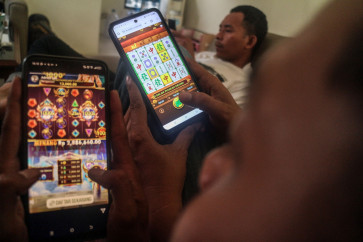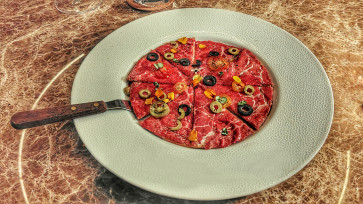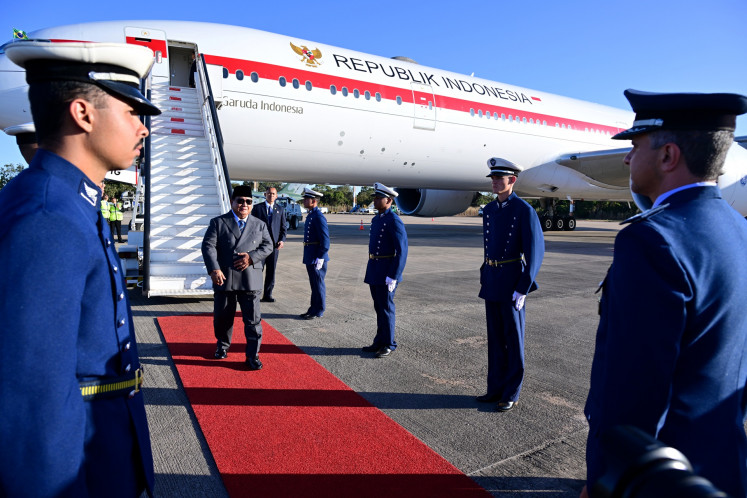Popular Reads
Top Results
Can't find what you're looking for?
View all search resultsPopular Reads
Top Results
Can't find what you're looking for?
View all search resultsCelebrating Easter, the day of salvation
Egg hunts for children, decorative eggs and chocolate bunnies are ready to color the celebration of Easter
Change text size
Gift Premium Articles
to Anyone
E
gg hunts for children, decorative eggs and chocolate bunnies are ready to color the celebration of Easter. Many hotels, cafés, restaurants and other places are tempting people to come and celebrate Easter on their premises.
Religious-wise, the Christian communities, both Protestant and Catholic, are ready to celebrate Easter with a series of services at their churches.
Easter celebrates the resurrection of Jesus Christ. The festival has its roots in the Jewish Passover, which commemorates Israel's deliverance from the bondage of Egypt. Nowadays, people around the world celebrate Easter in their own way but there is something universal bout it. The common ground of Easter for Protestant and Roman Catholic churches is that it is the most important religious festival in their calendar.
Although some Christian denominations do not celebrate Easter, the biggest Christian churches (Catholic and Protestant) share similarities in celebrating the feast. The Merriam-Webster’s Encyclopedia of World Religions shows that the common aspects found in most Roman Catholic, Eastern Orthodox and Protestant religious Easter celebrations comprise baptisms, the Eucharist, feasting and the “Christ is risen!” greeting.
According to the Encyclopedia, in Roman Catholicism, and some Lutheran and Anglican churches, Easter is celebrated with a vigil that consists of “the blessing of the new fire (a practice introduced during the early Middle Ages); the lighting of the paschal candle; a service of lessons, called the prophecies; followed by the blessing of the font and baptisms and then the mass of Easter.” In Orthodox churches, the vigil service is preceded by a procession outside the church. When the procession leaves the church, there are no lights on. The procession conducts a symbolic fruitless search for Christ’s body, and then joyfully announces, “Christ is risen!” When the procession returns to the church, hundreds of candles and lamps are lit to symbolize the splendor of Christ’s resurrection, and the Easter Eucharist is taken. Protestant observances also include baptism, supper and often a sunrise service.
It is, indeed, about the resurrection of Jesus and salvation.
Evangelist Jason Irwanto Chang says that Christian followers know that Easter is the most important feast in their faith as that day confirms Jesus Christ as the Savior through His death.
“In celebrating the feast of Easter, Christians all over the world are rejoicing Christ’s victory over death, which gives humankind hope for new life.”
Jason, a prominent religious song composer and singer in Indonesia, added that Christ came to die for humankind’s sins and offer redemption to the world.
“Jesus Christ is risen. He emerges to the new life of His resurrection, and through His resurrection, He saved those who believe. Easter is the victory and the fulfillment of His promises to our lives,” he reiterated.
Catholic priest Serafin Dany Sanusi OSC said that Easter is certainly a victory over sins and a day of salvation and hope.
“Easter, always observed on a Sunday, is to celebrate the resurrection of Jesus from death on the cross on Good Friday. This is a remission of humankind’s sins. This is the day of the victory. There’s salvation, and there’s also hope. That’s why Easter is the most important holiday of the Christian year, not Christmas nor Good Friday nor Palm Sunday,” he said.
Easter marks the end of Lent, a period of fasting and penitence that starts on Ash Wednesday and lasts 40 days. The week before Easter, known as the Holy Week, begins on the Sunday or Palm Sunday, while the last three days before Easter, namely Maundy Thursday, Good Friday and Holy Saturday, are referred to as the Triduum.
Father Sanusi added that in Catholicism, the meaning of the victory can be celebrated in local tradition or culture known as inculturation, in which local customs or ways of life color big religious festivals.
Inculturation, for example, involves the identification of traditional music to be reformulated so that it can be introduced in liturgical services.
The Catholic Church in Ganjuran, Bantul in Yogyakarta, for instance has traditionally marked celebrations in Javanese style, in which songs are sung in kromo inggil (the highest level of the Javanese language). There are also dancers in traditional Javanese costumes.
Many other Catholic churches and communities across the archipelago, like in Puh Sarang Church in Kediri, East Java, the Cathedral in Denpasar, Bali, and the Catholic community in Larantuka, Flores in East Nusa Tenggara, also have their inculturated activities in celebrating Easter.
“I think almost every church in every region in Indonesia has its own inculturation. The faith and what’s believed is universal. At Easter, it’s about victory and salvation,” said Father Sanusi.










